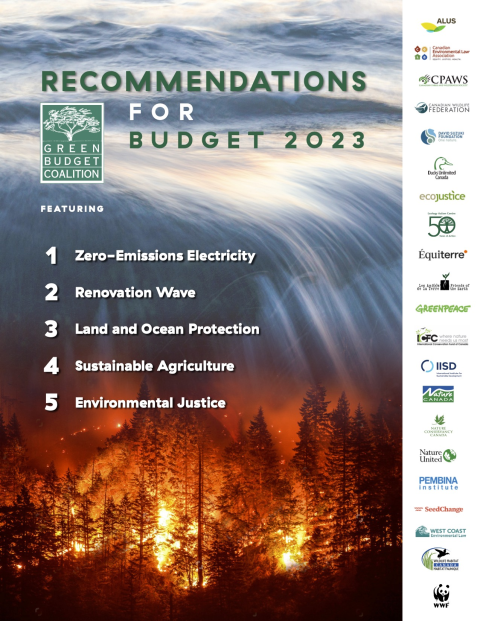The Green Budget Coalition (GBC), comprising 21 of Canada’s leading environmental organizations, appreciated the major federal funding announcements for climate and nature progress in Budget 2022 and the Emissions Reduction Plan, and urges the government to continue to seize this opportunity to transform society to address the twin climate and biodiversity crises, create sustainable jobs and ensure enduring prosperity and well-being for all.
The Green Budget Coalition welcomed the federal government’s multi-billion dollar investments in Budget 2022 that advanced the Coalition’s recommendations, particularly for energy-efficient buildings, zero-emission vehicles, and nature-based climate solutions. However, without effective use of such funding and further investments, Canada will not hit its targets for 40% to 45% reductions below 2005 levels in GHG emissions and protecting 30% of Canada’s land and water by 2030, nor contribute our fair share to global emission reductions and achieve full nature recovery by 2050.
Building on the Green Budget Coalition’s expertise, this document provides a comprehensive package of timely budget and fiscal recommendations whose adoption would advance progress on climate, nature, and equity, while creating jobs and protecting individual and collective health.
Recommendations
The Green Budget Coalition recommendations for Budget 2023 include:
- Advancing a zero-emissions electricity grid based on renewables – Essential steps towards the major transformational investments required in the generation, transmission, and demand side of electricity, including remote Indigenous communities ($18 billion plus $3 billion in tax benefits over five years);
- Renovation wave: a plan for jobs and climate – Upgrading the energy efficiency and comfort of Canada’s residential building stock, including low-income households, Indigenous communities, and skills development for the retrofit economy (in partnership with the provinces: $10 to $15 billion per year for 10 years);
- Institutionalizing environmental justice – Establishing an Office of Environmental Justice ($130 million over five years) and committing an appropriate portion of benefits from climate and clean energy spending to disadvantaged communities.
For all of the areas addressed in this document, we emphasize the importance of effective implementation, monitoring, and evaluation to ensure successful outcomes from new and ongoing programs.
Many of the recommendations in this document affect the rights and authorities of Indigenous peoples, including First Nations, Inuit, and Métis, whose traditional territories and knowledge are integral to the achievement of Canada’s climate and conservation goals. These recommendations should be considered in the context of reconciliation, and pursued in a manner in keeping with the United Nations Declaration on the Rights of Indigenous People.
Implementing these Green Budget Coalition recommendations would lead to transformative progress in advancing enduring environmental, economic, and social prosperity for all peoples in Canada from coast to coast to coast.













